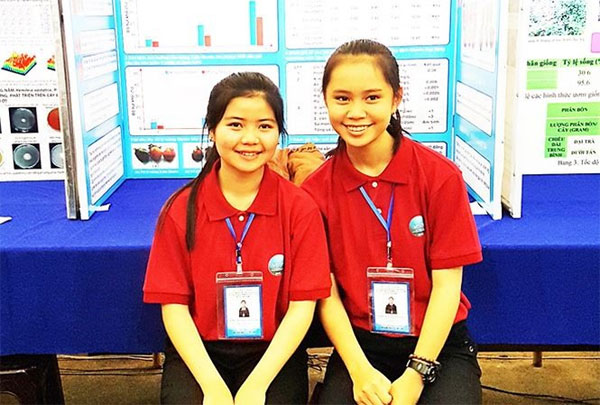
Preservation of agricultural products is a major technological challenge for large-scale producers, especially in a country like Vietnam with half of the population engaged in farming activities.
Preservation of agricultural products is a major technological challenge for large-scale producers, especially in a country like Vietnam with half of the population engaged in farming activities.
 |
|
Twelfth grader Nguyen Hoang Ngan and eleventh grader Phan Le Thao Phương of Don Duong High School, who took first place in a national competition for their work towards creating a film to help preserve produce. — Photo tienphong.vn |
Strawberries are a favourite in Da Lat, but are also among the hardest foods to preserve.
Inspired by their love of strawberries, two high school students in the Central Highlands province of Lam Dong have found a new, healthier way to preserve the fruit for a longer period of time.
Twelfth grader Nguyen Hoang Ngan and eleventh grader Phan Le Thao Phuong of Don Duong High School won first prize at a National Teenagers’ and Children’s Creativity Competition for their research on producing a film from silk fibroin to preserve strawberries.
The competition was organised by the Viet Nam Union of Science and Technology to unlock the creative potential of students. Living in a poor rural area, Ngan and Phuong were motivated to help local farmers, who suffered financially when their produce withered before they could sell it. Ngan said they paid particular attention to strawberries because the fruit contains a lot of water, making it more likely to perish during transportation.
In hot weather, strawberries sometimes arrive dried, shrunken and darkened by mold.
“Even at cool temperatures (about 15 decrees Celsius), the storage time of strawberries is only two to three days,” Ngan told the Tiền phong (Vanguard) newspaper. “The fragrance makes this fruit attractive to many types of bacteria so they spoil quickly once harvested.”
Picking or preserving strawberries improperly could lead to more microorganism growth, she said. Once one fruit is spoiled, the others will likely follow within a day.
Teacher Nguyen Thi Thanh Nga, who provided technical support to the students, said she advised the students to learn how farmers around the world preserve fruit. Then they could figure out which method is best for their community.
After school, Phuong and Ngan visited strawberry fields and talked with the owners. They read articles and searched the internet.
They quickly learned that farmers in their district removed damaged strawberries and kept healthy ones by freezing them, but this failed prevent deterioration.
Some garden owners used preservation chemicals which are very expensive and could have adverse effects on consumers’ health.
Not until they read that edible coatings made of chitosan might improve quality and shelf life did they think of using silkworm cocoons discard by the silk industry.
The two students went with Nga to visit silkworm rearing centres in Lam Ha District to buy cocoons for their research. They also sought help from the Centre for Radiation Technology under the Da Lat Nuclear Research Institute.
After more than eight months of research, the results were encouraging.
Once strawberries are dipped in the fibroin solution, it serves as a protective cover that keeps the fruit fresh for up to seven days, much longer than the usual two to three days. This method will be ideal for sellers to transport and distribute the products.
The fibroin coating will help reduce the dehydration of strawberries.
Another advantage of this preservation method is that it is cheap. The cost of preserving one kilogramme of fresh strawberries is only about VND324 (US$0.01).
Experts noted that Ngan and Phuong’s research was economically efficient and should be widely applicable.
"The biofilm helps preserve strawberries for a long time without affecting their color and taste, and is also safe for consumers,” said Tran Minh Chau, Vice President of the Lam Dong Union of Science and Technology Associations.
He said with the availability of silk waste and the irradiation facilities at Da Lat Nuclear Research Institute, it was possible to produce the biofilm on a large scale to preserve other fruits and agricultural products.
The film promises to bring about higher values for agricultural products and reduce pollution from silk production, he said.
For Ngan and Phuong, the work is just beginning. They said they would test combinations of the fibroin solution that include antifungal and antimicrobial substances to preserve fruit even longer.
(Source: VNS)





